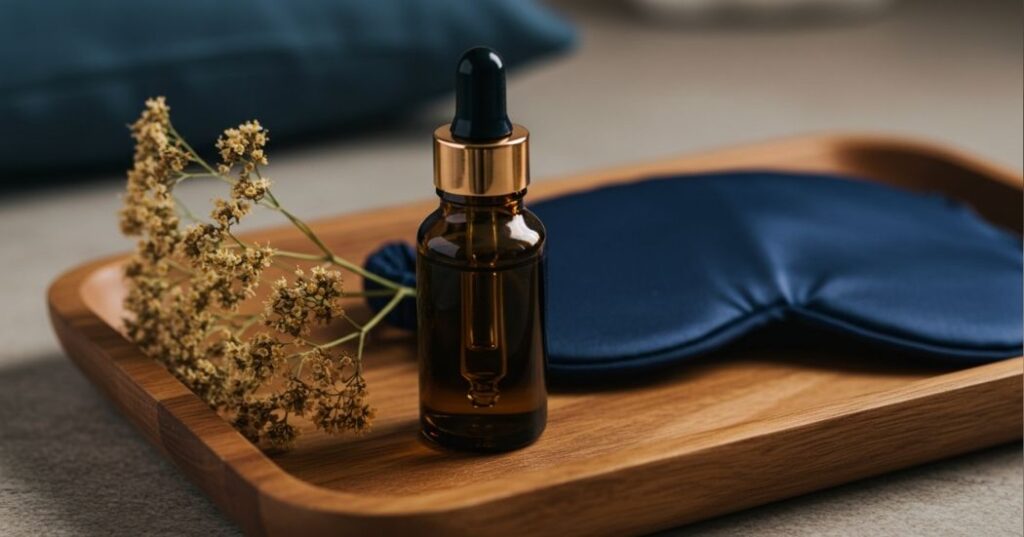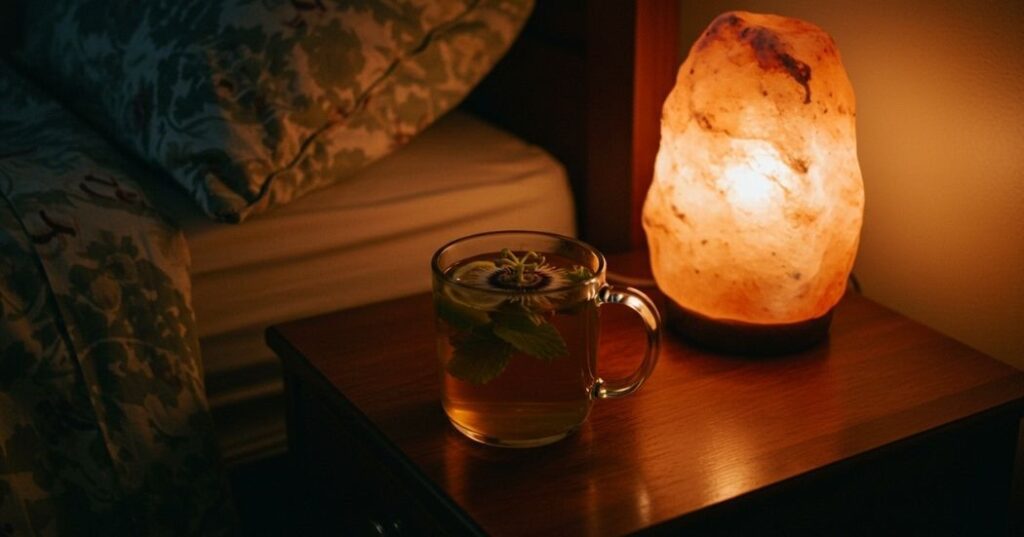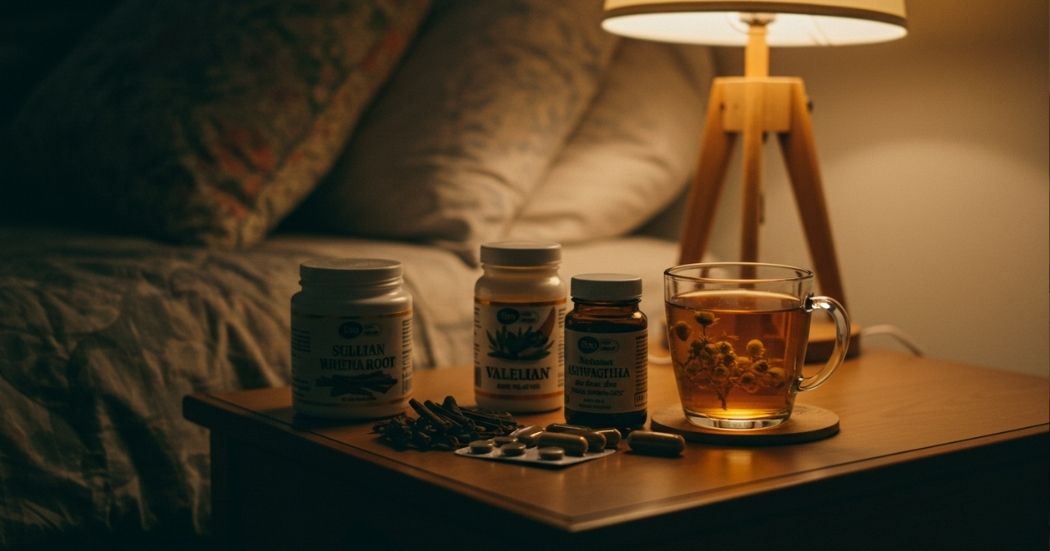Melatonin works for some—but not for everyone.
If you’ve ever felt groggy, dizzy, or overly dependent on sleep gummies, you’re not alone. Many people are now looking for natural sleep aids that don’t rely on melatonin—and for good reason. The quest for truly restorative sleep, free from unwelcome side effects, has led many to explore alternatives that work with the body’s natural rhythms, rather than simply overriding them.
This comprehensive guide explores melatonin-free alternatives that help support deep, restorative sleep—without the side effects or the morning-after fog.

Why Consider Skipping Melatonin? Understanding Its Role and Limitations
While melatonin plays a vital role in regulating our sleep-wake cycle, understanding its precise function is crucial. It’s a hormone, naturally produced by the pineal gland, that signals to your body when it’s time to prepare for sleep by adjusting your internal clock. However, it’s not a direct sedative or a “knock-out” pill. This distinction is key to understanding why many people find it ineffective for chronic sleep issues and why long-term or excessive use can lead to undesirable effects.
Prolonged reliance on synthetic melatonin, or even short-term overuse, can trigger several issues:
- Lingering Morning Grogginess: Instead of waking up refreshed, you might feel a persistent tiredness or a “hangover” effect. This is often a sign that the dosage or timing isn’t right for your body.
- Potential Hormonal Imbalances: Introducing exogenous hormones, especially over extended periods, can potentially disrupt your body’s delicate endocrine system. This is a particular concern for women, where hormonal balance is intricately linked to overall well-being.
- Developing Dependence or Tolerance: Your body might become accustomed to the external supply of melatonin, reducing its natural production. This can lead to a cycle where you need increasingly higher doses to achieve the same effect, making it harder to sleep without it.
- Vivid or Disturbing Dreams: Some users report an increase in intense, sometimes unsettling, dreams, which can detract from the quality of rest.
- Circadian Rhythm Mismatch: Melatonin is best utilized as a tool to adjust your circadian rhythm (like for jet lag or shift work), rather than a daily solution for general insomnia. Using it nightly when your circadian rhythm isn’t truly misaligned can ironically interfere with your body’s natural sleep signals over time.
As Harvard Health emphatically states, melatonin is fundamentally a circadian rhythm adjuster, not a go-to sleeping pill. Its primary strength lies in recalibrating your internal clock, not in forcibly inducing sleep.
What to Look for in Effective Natural, Non-Melatonin Sleep Aids
The best natural sleep aids operate by supporting your body’s inherent mechanisms for relaxation and sleep. They don’t just mask symptoms but instead address underlying factors that contribute to sleeplessness. When seeking out natural alternatives, look for ingredients and formulations that accomplish one or more of the following:
- Calm the Nervous System: These aids help shift your body out of the “fight or flight” (sympathetic) state and into the “rest and digest” (parasympathetic) state, allowing for genuine relaxation.
- Lower Core Body Temperature: A slight, natural dip in core body temperature is a physiological signal for your body to initiate sleep. Aids that facilitate this can be particularly effective.
- Promote Key Neurotransmitter Production: They enhance the natural production or activity of calming neurotransmitters like GABA (gamma-aminobutyric acid), which inhibits nerve activity, and serotonin, a precursor to melatonin and a regulator of mood and sleep.
- Reduce Anxiety and Racing Thoughts: Many struggle with sleep due to an overactive mind. The best natural aids help to quiet mental chatter and alleviate pre-sleep anxiety.
When evaluating specific products, prioritize these critical criteria:
- Clinically Supported Ingredients: Look for ingredients with scientific backing from reputable studies, ensuring their efficacy and safety. Don’t fall for fads; seek evidence.
- Non-Habit Forming: It’s paramount that any sleep aid you choose does not create physical or psychological dependence. The goal is to support natural sleep, not replace it.
- No Residual Drowsiness or “Hangover”: The ultimate test of a good sleep aid is how you feel the next morning. You should wake up feeling refreshed, alert, and energized, not groggy or impaired.
Top Natural Sleep Aids (Melatonin-Free) for Restorative Nights
Here’s an in-depth look at some of the most highly regarded natural, melatonin-free alternatives, each offering unique benefits to help you achieve profound, restorative sleep:
1. Magnesium Glycinate: The Mineral of Relaxation
Magnesium is an absolutely vital mineral involved in over 300 enzymatic reactions in the human body, many of which are directly linked to sleep regulation and stress response. While various forms of magnesium exist, Magnesium Glycinate stands out due to its superior bioavailability and its gentle nature on the digestive system, minimizing the common side effect of loose stools associated with other forms like magnesium citrate.
- How it works: Magnesium plays a critical role in supporting muscle relaxation and nerve function. Crucially, it’s a key cofactor in the activation of GABA receptors in the brain. By boosting GABA activity, magnesium helps to calm an overactive nervous system, reducing neuronal excitability and promoting a state of tranquility conducive to sleep. It also helps regulate melatonin production naturally, allowing your body to produce its own sleep hormone more efficiently.
- Especially useful if you struggle with: Restless legs syndrome (RLS), frequent muscle cramps or spasms at night, chronic stress, anxiety that keeps you awake, or difficulty fully relaxing before bed.
- Benefits: It’s gentle and non-sedating, meaning it doesn’t force sleep but rather facilitates your body’s natural ability to relax and drift off. It can also help alleviate anxiety and improve overall mood, contributing to better sleep quality.
- Recommended dosage: Typically 200-400 mg taken about an hour before bedtime.
- Best brand: Pure Encapsulations Magnesium Glycinate. This brand is renowned for its stringent quality control, hypoallergenic formulations, and the purity of its ingredients, making it a trusted choice for those seeking therapeutic efficacy.
2. L-Theanine: The Zen Amino Acid
Naturally abundant in green tea, L-Theanine is a unique amino acid celebrated for its remarkable ability to induce a state of calm focus without causing drowsiness. It’s what gives green tea its distinctive “smooth” energy, contrasting with the jittery effects of coffee.
- How it works: L-Theanine readily crosses the blood-brain barrier and works by increasing the levels of alpha brain waves, which are associated with a state of “wakeful relaxation” – a calm yet alert mental state similar to that achieved during meditation or deep relaxation. Furthermore, L-Theanine subtly increases levels of other calming neurotransmitters such as GABA, serotonin, and dopamine, all of which play vital roles in mood regulation, stress reduction, and sleep onset. It doesn’t sedate you, but rather creates an optimal mental environment for sleep to naturally occur.
- Best for: Individuals whose main sleep barrier is a “busy brain,” racing thoughts, pre-bedtime anxiety, or difficulty unwinding mentally after a stressful day. It’s also excellent for those who feel overstimulated by caffeine.
- Benefits: Promotes mental clarity and focus during the day, and a peaceful transition to sleep at night. It’s non-habit forming and does not cause morning drowsiness.
- Recommended dosage: 100-200 mg taken 30-60 minutes before bed.
- Try: Suntheanine-form L-Theanine. Suntheanine is a patented, highly pure, and rigorously tested form of L-Theanine, ensuring consistent quality and effectiveness, which is crucial for optimal results.
Examine.com Review
3. Glycine: The Sleep Temperature Regulator
Often recognized for its role in protein synthesis and collagen formation, Glycine is an amino acid with fascinating, direct implications for sleep quality that are often overlooked.
- How it works: Glycine operates as an inhibitory neurotransmitter in the central nervous system, meaning it helps to calm overactive nerve signals. Its most notable sleep-related mechanism is its ability to lower core body temperature. As the body prepares for sleep, a slight drop in temperature is a natural physiological signal. Glycine facilitates this process, making it easier to initiate and maintain sleep.
- Benefits: Studies have shown that glycine can objectively improve subjective sleep quality, reduce the time it takes to fall asleep, and decrease symptoms of fatigue and sleepiness the following day, even after a night of restricted sleep.
- Bonus benefits: Beyond sleep, glycine is crucial for collagen production (beneficial for skin, hair, nails, and joints), supports liver detoxification, and aids in gut health.
- Recommended dosage: Typically 3 grams (3,000 mg) taken 30-60 minutes before bed. It has a slightly sweet taste and dissolves easily in water.
- Product pick: NOW Foods Glycine Powder. This is a highly cost-effective option, and the powder form allows for flexible dosing and easy integration into a bedtime beverage.
Buy on Amazon
4. Valerian Root (Standardized Extract): The Time-Tested Herbal Sedative

Valerian Root is one of the most extensively studied and widely used herbal remedies for sleep in Western herbal medicine, with a history spanning centuries.
- How it works: While its exact mechanisms are complex and not fully elucidated, Valerian is believed to enhance the activity of GABA in the brain, similar to how some pharmaceutical sedatives work, but in a milder, more natural fashion. It contains compounds like valerenic acid and valepotriates, which are thought to have sedative and anxiolytic (anxiety-reducing) properties.
- May help with: Reducing the time it takes to fall asleep, improving overall sleep quality, and alleviating mild to moderate insomnia. Some find it particularly effective for anxiety that interferes with sleep.
- Important note: Valerian has a distinctive, earthy odor that some find unpleasant. Therefore, it’s crucial to look for low-odor, standardized extracts to ensure consistent potency and minimize sensory discomfort. It may take a few weeks of consistent use to see its full effects.
- Recommended dosage: Varies by extract, typically 300-600 mg of a standardized extract an hour before bed.
- Product: Gaia Herbs Valerian Root. Gaia Herbs is a leader in organic, ethically sourced herbal supplements, ensuring high purity and potency in their standardized extracts.
Buy on iHerb
Want to explore more non-melatonin alternatives?
→ Beyond Melatonin: Natural Sleep Aids for Deep, Restorative Sleep
5. Passionflower or Lemon Balm: Gentle Herbal Soothers
These two gentle yet effective herbal adaptogens are often used synergistically or individually to calm the nervous system and promote relaxation, making them excellent choices for those seeking a mild, non-addictive sleep aid.

Gentle herbs like passionflower and lemon balm help soothe the nervous system without causing next-day grogginess- Passionflower (Passiflora incarnata): This beautiful vine has a long history of use for anxiety, insomnia, and nervous restlessness. It’s believed to increase levels of GABA in the brain, helping to quiet nerve activity and induce a feeling of calm. It’s particularly good for easing agitated states that prevent sleep.
- Lemon Balm (Melissa officinalis): A fragrant member of the mint family, Lemon Balm is cherished for its mood-enhancing and calming properties. It’s thought to act on GABA receptors and also inhibit an enzyme that breaks down GABA, thereby increasing its availability in the brain. It’s excellent for reducing stress, improving mood, and promoting restful sleep.
- How they work: Both herbs exert mild sedative and anxiolytic effects, helping to soothe emotional restlessness, alleviate tension, and make the transition to sleep smoother. They don’t force sleep but rather create a more conducive internal environment for it.
- Great for: Mild insomnia, general nervous tension, emotional agitation, or for those who prefer a gentle, tea-based approach to relaxation.
- Often found: These herbs are commonly blended in calming sleep teas, tinctures, or as components in broader sleep support formulas.
- Try: Traditional Medicinals Nighty Night Tea. This blend often combines passionflower and lemon balm with other calming herbs like chamomile, providing a comforting and effective ritual for winding down before bed.
Visit Brand
Expert Tips for Deeper Sleep: Holistic Approaches for Lasting Rest
While natural supplements can provide valuable support, they are most effective when integrated into a holistic approach to sleep hygiene. These practices work synergistically with any supplements to optimize your body’s natural sleep capabilities:
- Establish a Sacred Wind-Down Ritual (60–90 minutes before bed): This is perhaps the single most impactful habit you can cultivate. During this crucial window, signal to your body that it’s time to transition from activity to rest. This means:
- Screens Off: The blue light emitted by phones, tablets, and computers can suppress melatonin production and keep your brain artificially alert. Replace screen time with calming activities.
- Dim Lighting: Lower the lights in your home to signal to your brain that evening is approaching.
- Calming Activities: Read a physical book, listen to relaxing music, engage in light stretching or gentle yoga, take a warm (not hot) bath with Epsom salts, or practice mindful breathing exercises.
- Optimize Your Sleep Environment with Cooling Tools: Your body naturally cools down as you prepare for sleep. Facilitate this process by:
- Keeping Your Bedroom Cool: The ideal temperature for sleep is typically between 18-20°C (65-68°F).
- Using a Fan: Even a small fan can help circulate air and provide a cooling sensation.
- Investing in Cool Bedding: Opt for breathable fabrics like cotton or linen. Consider cooling pillows or mattresses if you tend to overheat.
- Cool Foot Soaks: Soaking your feet in cool water before bed can help lower overall body temperature and promote relaxation.
- Practice Bedtime Journaling to Unload Your Mind: If your thoughts race or worries keep you awake, dedicating 10-15 minutes to journaling before bed can be incredibly therapeutic. Write down your to-do lists, concerns, or anything that’s on your mind. This process helps to “offload” these thoughts from your mental space, allowing you to approach sleep with a clearer, calmer mind.
- Explore NSDR Protocols or Yoga Nidra for Deep Relaxation: Non-Sleep Deep Rest (NSDR) or Yoga Nidra (yogic sleep) are guided meditation practices that induce a profound state of physical and mental relaxation. They are not about sleeping, but about achieving a deeply restful, conscious state that can then naturally lead to sleep. Many high-quality, free guided protocols are available on YouTube or through various meditation apps. This can be a game-changer for those who struggle with high anxiety or difficulty disconnecting from their day.
Final Thoughts: Reclaiming Your Natural Sleep
If melatonin left you groggy, frustrated, or dependent, know this: You absolutely have effective, natural options.
Achieving deep, restorative sleep isn’t about finding a magic pill; it’s about understanding and supporting your body’s innate capacity for rest. By integrating the right blend of targeted nutrition, insightful neuroscience, and potent plant medicine with mindful daily practices, truly better sleep is not only possible—it’s entirely within your natural reach. You can break free from the cycle of groggy mornings and embrace a life of energetic, well-rested days.
Tired of waking up groggy and unrefreshed? Explore our curated selection of melatonin-free sleep solutions designed with clean, non-habit forming ingredients, engineered to support your body’s natural path to deep, restorative rest. What small step will you take tonight to begin your journey to better sleep?
📚 References
- Inagawa, K., et al. (2006). L-Theanine, a natural constituent in tea, and its effect on mental state. Asia Pacific Journal of Clinical Nutrition, 15(2), 199–204.
https://www.ncbi.nlm.nih.gov/pubmed/16886681 - Bannai, M., et al. (2012). The Effects of Glycine on Subjective Sleep Quality in Humans. Sleep and Biological Rhythms, 10, 145–150.
https://doi.org/10.1111/j.1479-8425.2012.00541.x - Kennedy, D. O., et al. (2006). Lemon balm and valerian effects on anxiety and sleep quality. Phytotherapy Research, 20(8), 683–689.
https://doi.org/10.1002/ptr.1933

